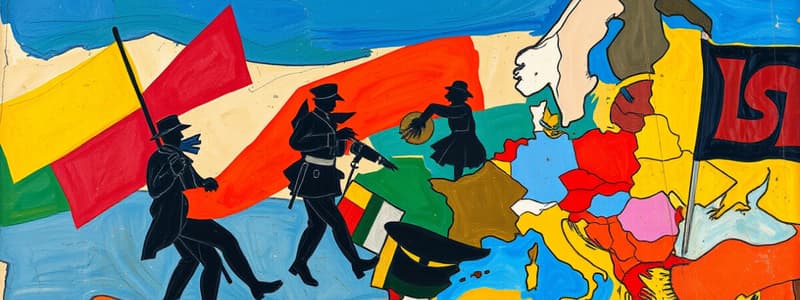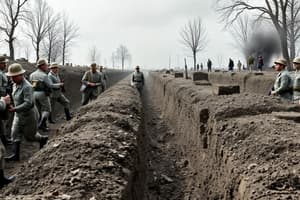Podcast
Questions and Answers
What were the two alliances involved in World War I?
What were the two alliances involved in World War I?
- The Central Powers and the Allies
- The NATO and Warsaw Pact
- The League of Nations and the Axis Powers
- The Triple Entente and the Triple Alliance (correct)
How did nationalism contribute to conflicts among countries in Europe leading up to World War I?
How did nationalism contribute to conflicts among countries in Europe leading up to World War I?
- It decreased competition among European powers.
- It encouraged peaceful discussions between nations.
- It primarily focused on economic collaboration.
- It heightened pride and connection to nations, leading to conflict. (correct)
What was a significant effect of militarism during the lead-up to World War I?
What was a significant effect of militarism during the lead-up to World War I?
- Neglect of diplomatic relations among countries.
- Complete disarmament of all European nations.
- An arms race driven by nationalism and alliances. (correct)
- Reduction in military spending across Europe.
Which of the following best describes imperialism's role in the tensions leading to World War I?
Which of the following best describes imperialism's role in the tensions leading to World War I?
Which factor is NOT considered one of the main causes of World War I?
Which factor is NOT considered one of the main causes of World War I?
Flashcards are hidden until you start studying
Study Notes
Causes of World War I
- Alliances: Agreements formed between countries for mutual protection, aimed at safeguarding military, political, or economic interests.
- Key Alliances:
- Triple Entente: Comprised France, Russia, and Britain.
- Triple Alliance: Consisted of Germany, Austria-Hungary, and Italy.
- Nationalism:
- An intense pride and devotion to one's nation, leading to a desire for self-determination and influence.
- Fueled competition and hostility, particularly in the context of territorial disputes in Germany, Italy, and the Balkans.
- Militarism:
- Significant increase in military spending and resources; nations prioritized the expansion of armed forces and stockpiling weapons.
- An arms race emerged driven by national pride and the need for security through military strength.
- Imperialism:
- European nations sought to expand their influence and power beyond their borders, pursuing colonies for resources and strategic advantages.
- Conflicts over colonial territories in Asia and Africa heightened tensions among European powers, contributing to an unstable political climate at home.
Studying That Suits You
Use AI to generate personalized quizzes and flashcards to suit your learning preferences.




